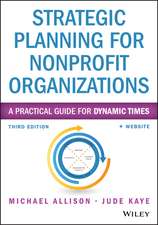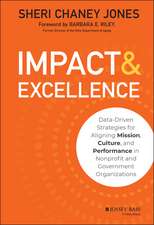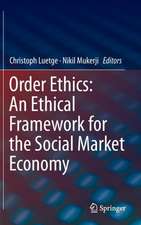Business Ethics and Risk Management: Ethical Economy, cartea 43
Editat de Christoph Luetge, Johanna Jauernigen Limba Engleză Hardback – 16 dec 2013
| Toate formatele și edițiile | Preț | Express |
|---|---|---|
| Paperback (1) | 634.18 lei 6-8 săpt. | |
| SPRINGER NETHERLANDS – 18 sep 2016 | 634.18 lei 6-8 săpt. | |
| Hardback (1) | 640.37 lei 6-8 săpt. | |
| SPRINGER NETHERLANDS – 16 dec 2013 | 640.37 lei 6-8 săpt. |
Din seria Ethical Economy
- 18%
 Preț: 788.72 lei
Preț: 788.72 lei -
 Preț: 280.54 lei
Preț: 280.54 lei - 18%
 Preț: 1007.35 lei
Preț: 1007.35 lei - 18%
 Preț: 892.90 lei
Preț: 892.90 lei - 18%
 Preț: 782.42 lei
Preț: 782.42 lei -
 Preț: 497.00 lei
Preț: 497.00 lei - 15%
 Preț: 644.95 lei
Preț: 644.95 lei -
 Preț: 387.38 lei
Preț: 387.38 lei -
 Preț: 486.42 lei
Preț: 486.42 lei - 18%
 Preț: 948.79 lei
Preț: 948.79 lei - 18%
 Preț: 958.38 lei
Preț: 958.38 lei - 15%
 Preț: 634.18 lei
Preț: 634.18 lei - 15%
 Preț: 639.59 lei
Preț: 639.59 lei - 18%
 Preț: 942.94 lei
Preț: 942.94 lei - 15%
 Preț: 635.31 lei
Preț: 635.31 lei - 18%
 Preț: 949.42 lei
Preț: 949.42 lei - 15%
 Preț: 635.15 lei
Preț: 635.15 lei - 15%
 Preț: 635.47 lei
Preț: 635.47 lei - 18%
 Preț: 893.84 lei
Preț: 893.84 lei - 18%
 Preț: 948.92 lei
Preț: 948.92 lei -
 Preț: 391.61 lei
Preț: 391.61 lei - 18%
 Preț: 948.61 lei
Preț: 948.61 lei - 18%
 Preț: 1232.09 lei
Preț: 1232.09 lei - 18%
 Preț: 951.91 lei
Preț: 951.91 lei - 18%
 Preț: 1226.11 lei
Preț: 1226.11 lei - 18%
 Preț: 936.93 lei
Preț: 936.93 lei - 15%
 Preț: 641.53 lei
Preț: 641.53 lei - 18%
 Preț: 953.35 lei
Preț: 953.35 lei - 15%
 Preț: 635.96 lei
Preț: 635.96 lei - 18%
 Preț: 958.38 lei
Preț: 958.38 lei - 15%
 Preț: 632.55 lei
Preț: 632.55 lei - 15%
 Preț: 641.20 lei
Preț: 641.20 lei - 15%
 Preț: 633.53 lei
Preț: 633.53 lei - 15%
 Preț: 646.30 lei
Preț: 646.30 lei - 18%
 Preț: 949.23 lei
Preț: 949.23 lei -
 Preț: 487.57 lei
Preț: 487.57 lei - 15%
 Preț: 639.59 lei
Preț: 639.59 lei - 15%
 Preț: 636.45 lei
Preț: 636.45 lei - 18%
 Preț: 942.01 lei
Preț: 942.01 lei - 18%
 Preț: 964.23 lei
Preț: 964.23 lei - 18%
 Preț: 1221.69 lei
Preț: 1221.69 lei
Preț: 640.37 lei
Preț vechi: 753.39 lei
-15% Nou
Puncte Express: 961
Preț estimativ în valută:
122.55€ • 127.47$ • 101.17£
122.55€ • 127.47$ • 101.17£
Carte tipărită la comandă
Livrare economică 15-29 aprilie
Preluare comenzi: 021 569.72.76
Specificații
ISBN-13: 9789400774407
ISBN-10: 9400774400
Pagini: 168
Ilustrații: VIII, 160 p. 5 illus., 3 illus. in color.
Dimensiuni: 155 x 235 x 15 mm
Greutate: 0.42 kg
Ediția:2014
Editura: SPRINGER NETHERLANDS
Colecția Springer
Seria Ethical Economy
Locul publicării:Dordrecht, Netherlands
ISBN-10: 9400774400
Pagini: 168
Ilustrații: VIII, 160 p. 5 illus., 3 illus. in color.
Dimensiuni: 155 x 235 x 15 mm
Greutate: 0.42 kg
Ediția:2014
Editura: SPRINGER NETHERLANDS
Colecția Springer
Seria Ethical Economy
Locul publicării:Dordrecht, Netherlands
Public țintă
ResearchCuprins
1) Risk Management and Risk Taking; Christoph Luetge: Risk Taking and the Ethics of Entrepreneurship.- 2) Risk Management on Financial Markets.- Elena Esposito: The Present Use of the Future: Management and Production of Risk on Financial Markets.- Boudewijn de Bruin: Epistemically Virtuous Risk Management: Financial Due Diligence and Uncovering the Madoff Fraud.- 3) Risk Management in Organizations.- Jacob Dahl Rendtorff: Risk Management, Banality of Evil and Moral Blindness in Organizations and Corporations.- Cristina Besio: Transforming Risks into Moral Issues in Organizations.- Matthias Gronemeyer: Decision-Making as Navigational Art: A Pragmatic Approach to Risk Management.- 4) Philosophical Issues of Risk Management.- Thomas Beschorner: Beyond Risk Management, Toward Ethics – Institutional und Evolutionary Perspectives.- Nikil Mukerji: Consequentialism, Deontology and the Morality of Promising.- 5) Risk Management in Specific Systems.- Julie Jebeile: The Nuclear Power Plant: Our New “Tower of Babel”?.- Nguyen Hoang Anh: The Global Economic Crisis as a Risk for the International Trade in Hanoi.
Textul de pe ultima copertă
This volume explores various aspects of risk taking. It offers an analysis of financial, entrepreneurial and social risks, as well as a discussion of the ethical implications of empirical findings. The main issues examined in the book are the financial crisis and its implications for business ethics. The book discusses unethical behaviour as a reputational risk (e.g., in the case of Goldman Sachs) and the question is raised as to what extent the financial crisis has changed the banks’ entrepreneurial strategy. The book presents an analysis of the reasons leading to the crisis and identifies them as ethical dilemma structures. In addition, it looks at general questions regarding ethical behaviour and risk taking, such as: To what extent does the social embeddedness or abstraction play a role in guaranteeing ethical behaviour? What conclusions can be drawn from institutional or evolutionary perspectives on risk management? Finally, the book discusses further issues that become factors of risk within and between societies, such as work insecurity, corruption or the problem of facilitation payments as a risk in international transactions.
Caracteristici
First volume to explicitly connect management and business ethics Focuses on the highly topical issues of Ethics and Risk in the light of the financial crisis Approaches risk management from a uniquely diverse, interdisciplinary angle Brings together business ethicists, economists, sociologists and risk analysts?















